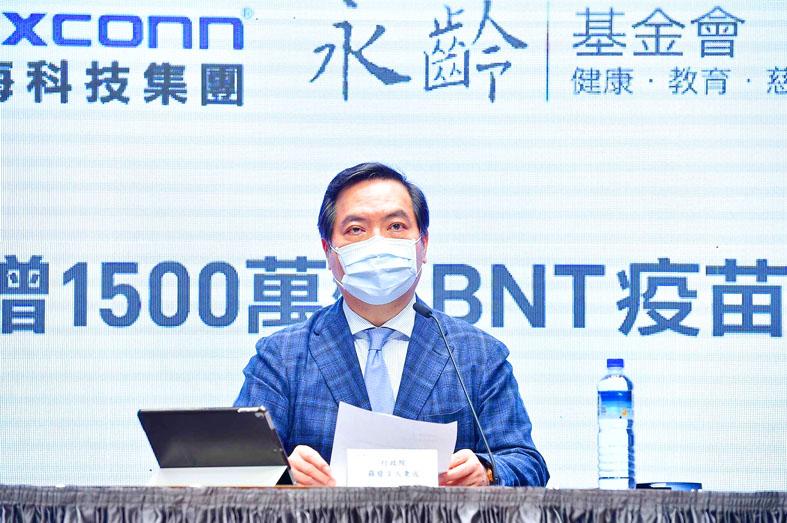The Buddhist Compassion Relief Tzu Chi Foundation yesterday signed a contract with Shanghai Fosun Pharmaceutical Group Co (上海復星醫藥集團) to purchase 5 million doses of BioNTech’s COVID-19 vaccine, the Executive Yuan said.
Shanghai Fosun is the German company’s agent for distributing COVID-19 vaccines in Taiwan and China, including Hong Kong and Macau.
At about 8am, the foundation submitted documents to the Centers for Disease Control (CDC) to be reviewed, Executive Yuan spokesman Lo Ping-cheng (羅秉成) told a news conference in the afternoon.

Photo courtesy of the Executive Yuan
At about 10am, CDC Director-General Chou Jih-haw (周志浩) signed a contract with the foundation regarding its plan to donate the BioNTech vaccines to the government, Lo said.
In terms of donation principles, the contract framework and conditions, the government’s deal with the foundation is the same as its agreements with Taiwan Semiconductor Manufacturing Co (TSMC, 台積電) and the Hon Hai Precision Industry Co (鴻海精密)-affiliated Yonglin Foundation, Lo said.
The vaccines would be delivered by BioNTech to Taiwan directly and items would not be labeled with the vaccine’s Chinese name, Comirnaty (復必泰), sources familiar with the matter said.
The vaccines procured by the three entities would arrive before the end of September, the sources said, adding that the unit prices for each are similar.
The special project of the Executive Yuan allowed the entities to procure a combined 15 million doses, 5 million each, from the German firm, which is to deliver them in several shipments, Lo said.
The BioNTech vaccines would be distributed via the government’s online COVID-19 vaccination booking system when they become available, he said.
The CDC would apply for emergency use authorization permits from the Food and Drug Administration to import and use the vaccines, Lo said.
People aged 12 to 18 have been approved to receive shots of the BioNTech vaccine, he said.
Asked about difficulties with the Tzu Chi foundation’s application, Lo said that it filed its proposal with the ministry on June 23, but the Executive Yuan initially did not give its approval, as it was tackling the TSMC and YongLin Foundation applications.
After deliberation, the Executive Yuan on July 1 also established a special project for the Tzu Chi foundation’s plan, he said.
The CDC on July 9 signed documents with the Tzu Chi foundation for vaccine procurement, he said.
The Executive Yuan completed the procedure in one month because it used the same model as the other two projects, he said.

CHAOS: Iranians took to the streets playing celebratory music after reports of Khamenei’s death on Saturday, while mourners also gathered in Tehran yesterday Iranian Supreme Leader Ayatollah Ali Khamenei was killed in a major attack on Iran launched by Israel and the US, throwing the future of the Islamic republic into doubt and raising the risk of regional instability. Iranian state television and the state-run IRNA news agency announced the 86-year-old’s death early yesterday. US President Donald Trump said it gave Iranians their “greatest chance” to “take back” their country. The announcements came after a joint US and Israeli aerial bombardment that targeted Iranian military and governmental sites. Trump said the “heavy and pinpoint bombing” would continue through the week or as long

TRUST: The KMT said it respected the US’ timing and considerations, and hoped it would continue to honor its commitments to helping Taiwan bolster its defenses and deterrence US President Donald Trump is delaying a multibillion-dollar arms sale to Taiwan to ensure his visit to Beijing is successful, a New York Times report said. The weapons sales package has stalled in the US Department of State, the report said, citing US officials it did not identify. The White House has told agencies not to push forward ahead of Trump’s meeting with Chinese President Xi Jinping (習近平), it said. The two last month held a phone call to discuss trade and geopolitical flashpoints ahead of the summit. Xi raised the Taiwan issue and urged the US to handle arms sales to

BIG SPENDERS: Foreign investors bought the most Taiwan equities since 2005, signaling confidence that an AI boom would continue to benefit chipmakers Taiwan Semiconductor Manufacturing Co’s (TSMC, 台積電) market capitalization swelled to US$2 trillion for the first time following a 4.25 percent rally in its American depositary receipts (ADR) overnight, putting the world’s biggest contract chipmaker sixth on the list of the world’s biggest companies by market capitalization, just behind Amazon.com Inc. The site CompaniesMarketcap.com ranked TSMC ahead of Saudi Aramco and Meta Platforms Inc. The Taiwanese company’s ADRs on Tuesday surged to US$385.75 on the New York Stock Exchange, as strong demand for artificial intelligence (AI) applications led to chip supply constraints and boost revenue growth to record-breaking levels. Each TSMC ADR represents

State-run CPC Corp, Taiwan (CPC, 台灣中油) yesterday said that it had confirmed on Saturday night with its liquefied natural gas (LNG) and crude oil suppliers that shipments are proceeding as scheduled and that domestic supplies remain unaffected. The CPC yesterday announced the gasoline and diesel prices will rise by NT$0.2 and NT$0.4 per liter, respectively, starting Monday, citing Middle East tensions and blizzards in the eastern United States. CPC also iterated it has been reducing the proportion of crude oil imports from the Middle East and diversifying its supply sources in the past few years in response to geopolitical risks, expanding